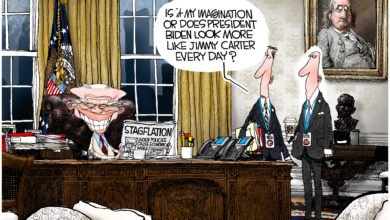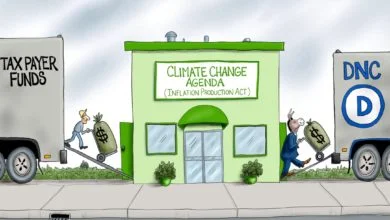Is the NFL Draft Socialism?
Football fans rejoice! It’s every NFL junky’s favorite spring sports week. This week begins the NFL draft, where professional football teams select the best college players to join their teams.
While it’s a good time for sports fans, the NFL draft often serves as a hayday for critics of American capitalism. Why?
Well, according to some, the NFL draft is socialism!
“We’re 26 Republicans who vote like socialists,” Art Modell, the late owner of the Baltimore Ravens, once quipped.
The reasoning by such critics is straightforward. The NFL draft works by providing the worst teams with the first picks in the draft, giving them first crack at the top talent. In the mind of critics, this demonstrates something like Karl Marx’s maxim: “to each according to his need.”
By admitting the worst team should be given the best resources, the NFL admits that the worst off among us should receive more of society’s resources and opportunities, or so critics claim.
But critics are wrong. The NFL draft is actually an amazing organizational device for the pursuit of profit. Let’s see why.
Competitors in Name, Teammates in Practice
To understand why the NFL draft is not socialism, we should start off by noting that NFL teams are not really competitors from the perspective of their businesses.
Consider the difference between the NFL and the fast food industry. McDonalds would like nothing better than to offer a product so cheap and attractive that it drives every competitor out of existence. McDonalds is looking to take customers away from Burger King, Wendys, and the like.
This isn’t how competition works in the NFL, however. When the Bengals play the Rams, they aren’t looking to drive the Rams into bankruptcy. In fact, it would be bad for the Bengals if they started to bankrupt other teams. Imagine a Superbowl that’s won by default because the Rams don’t have money to fly their players out to play.
Bad business is bad for the NFL. In this sense teams are, at least somewhat, more like different franchises of the same overarching business. McDonalds doesn’t work if the franchise owners try to drive other Mcdonalds franchise owners out of business.
So who do NFL teams compete with? Well, consider their customers. The Kansas City Chiefs aren’t hoping to convert Green Bay fans when they win the Superbowl. They’re hoping to win over, for example, Missouri residents who normally only care about baseball or college football. NFL teams compete with other sports or leagues (such as the XFL).
Even though the sports teams are legally different entities, their success depends on the success of the company known as the NFL.
Are McDonalds franchise-owners socialists when they join forces to destroy Burger King? Obviously not. A definition of socialism that broad drains the term of all meaning.
There’s Always Next Year?
So we’ve established teams are not really business competitors in the usual sense. But there is an even more surprising sense in which teams aren’t competitors.
Crazy claim? Not at all. Imagine if you will, a world where your favorite team is guaranteed to win every game. This may sound like heaven. But consider how many games you’ll attend or even watch.
It might be fun at first, but by year ten of unchallenged dominance, do you think you’d even bother looking up the scores of games? Like many things that sound like heaven, single-team dominance is actually hell.
An instrumental part of the value of the NFL (and all sports) is some balance to the competition.
A league where there is never a clear favorite is probably too random to be interesting. This is probably why we don’t have competitive coin-flipping. But a league where the favorite always wins is equally boring. Why watch if you know the outcome?
If the value of the league deteriorates, so does the value of the teams in the league. So, somehow, NFL teams need to organize in such a way that they don’t actually figure out how to win every game.
By giving the worst teams first pick of the best players out of college, the NFL can mitigate the chances of any one team achieving total dominance or irrelevance. There’s always a chance your team can win (or lose).
Unconvinced by the theory still? Sport economist Michael Leeds summarizes study findings in his book The Economics of Sports:
Several empirical studies show that fans enjoy an uncertain outcome and are most likely to attend games in which the home team has a 60 to 70 percent chance of winning.
So remember the reason why the NFL and team owners pursue balance–increasing fan interest and therefore profit. To paraphrase Adam Smith, it’s not from the benevolence of the superior football teams that they let the bad teams get the top picks, but from their regard to their own interest.
Again, this doesn’t sound much like Marx to me.
The History of the Draft
Once we recognize that teams aren’t really business competitors, and insofar as there is athletic competition it’s tempered to maximize profit, the claim that the draft is socialism rings pretty hollow.
But, as if this weren’t enough, history also debunks the claim that the draft is a socialist institution.
In 1934, Minnesota Gophers’ senior running back, Stan Kostka, led his team to an undefeated season and made himself the top prospect for professional teams. As a result, teams engaged in a bidding war which ended in Stan going to the (no longer existing) Brooklyn Dodgers.
As a result of the bidding war, Kostka became the highest paid player in the NFL (with a $5,000 contract).
The owner of the Philadelphia Eagles was so mad about losing the bidding war that he proposed the idea of the draft to the NFL the following year.
So, in other words, the NFL draft started as a way for team owners to cooperate to keep player wages below where they would be if bidding wars were allowed.
To be fair, I haven’t read everything Marx wrote. But something tells me a system where capital owners cooperate to keep employer bidding wars from occurring isn’t praised in some obscure work he and Engels published. In fact, this is about as opposite to Marx as you can get.
In the modern day, players have formed unions to combat owner cooperation, but the point remains the same. The NFL is a highly sophisticated organizational structure that allows athletic competitors to cooperate in the goal of making money.
So, insofar as Americans enjoy the exciting games created by the draft system, they don’t have socialism to thank. Instead they should thank the cooperation facilitated by self-interest channeled through the free market.
The NFL Draft is not socialism. It’s capitalism on steroids.
Content syndicated from Fee.org (FEE) under Creative Commons license.
Agree/Disagree with the author(s)? Let them know in the comments below and be heard by 10’s of thousands of CDN readers each day!




